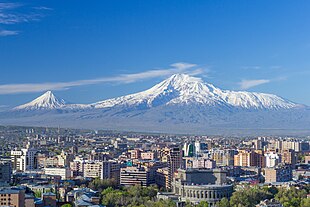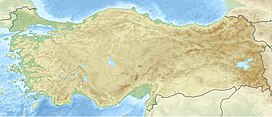Mount Ararat (/ˈærəˌræt/ ARR-ə-rat;[8] Turkish: Ağrı Dağı; Armenian: Մասիս, Masis and Արարատ, Ararat) is a snow-capped and dormant compound volcano in the extreme east of Turkey.[9] It consists of two major volcanic cones: Greater Ararat, the highest peak in Turkey and the Armenian plateau with an elevation of 5,137 m (16,854 ft); and Little Ararat, with an elevation of 3,896 m (12,782 ft).[10] The Ararat massif is about 40 km (25 mi) in diameter.
Despite the scholarly consensus that the “mountains of Ararat” of the Book of Genesis do not refer to specifically Mt. Ararat, it has been widely accepted in Abrahamic religions as the resting place of Noah’s Ark. It is the principal national symbol of Armenia and has been considered a sacred mountain by Armenians. It is featured prominently in Armenian literature and art and is an icon for Armenian irredentism. Along with Noah’s Ark, it is depicted on the coat of arms of Armenia.
The first efforts to reach Ararat’s summit were made in the Middle Ages. However, it was not until 1829 when Friedrich Parrot and Khachatur Abovian, accompanied by four others, made the first recorded ascent

